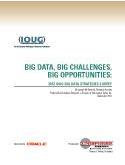
As more data becomes available from an abundance of sources both within and outside, organizations are seeking to use those abundant resources to increase innovation, retain customers, and increase operational efficiency. At the same time, organizations are challenged by their end users, who are demanding greater capability and integration to mine and analyze burgeoning new sources of information.
Key highlights and findings from the survey, which explores Big Data issues and solutions, include the following:
- More than one out of 10 data managers now have in excess of a petabyte of data within their organizations, and a majority of respondents report their levels of unstructured data are growing. Fewer than one out of five feel their IT infrastructure will be ready to handle this incoming surge of data. Protecting data overall is important, but unstructured data gets low priority at this time.
- While many organizations are still struggling to understand the business value of Big Data, more than 50% consider it to be extremely or very important to their business. The greatest opportunities Big Data offers are in competing more effectively (40%) and growing business revenue streams (32%).Most Big Data initiatives currently come out of the IT department, but the first business applications are being seen in marketing and sales—an area typically already comfortable with data analytics.
- Hadoop—often seen as the cornerstone of many Big Data efforts— has yet to catch on within most Oracle environments. This suggests that many organizations are just starting to address Big Data storage requirements. Adoption of Hadoop, in fact, is expected to double over the coming year.
Big Data, Big Challenges, Big Opportunities: 2012 IOUG Big Data Strategies Survey was produced by Unisphere Research in partnership with the Independent Oracle Users Group, and sponsored by Oracle.